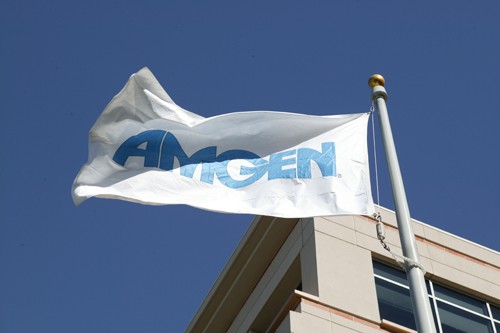
Amgen has agreed to buy Dezima Pharma to add a new drug to its cardiovascular pipeline, and forged a broad collaboration with Xencor in oncology and inflammation.
The US biotech is paying $300m upfront to acquire Dezima and gain control of its lead drug, an orally-active cholesterol inhibitor called TA-8995 that has shown promise in a phase II trial. Dezima shareholders also stand to receive up to $1.25bn in potential milestone payments.
The collaboration with Xencor meanwhile covers six antibody programmes and includes a $45m upfront payment and up to $1.7bn in clinical, regulatory and sales milestones.
Adding Dezima’s TA-8995 to its portfolio gives Amgen an oral drug that could complement its recently-approved injectable cholesterol drug Repatha (evolocumab), which is going head-to-head in the marketplace with Sanofi and Regeneron’s rival drug Praluent (alirocumab).
In a phase IIb trial reported earlier this year, TA-8995 reduced low-density lipoprotein cholesterol (LDL-c) by 45%-48% compared to baseline, with the reduction consistent regardless of whether the drug was given on its own or alongside statins.
The drug is a CETP inhibitor, in the same class as drugs such as Eli Lilly’s evacetrapib, Merck & Co’s anacetrapib and Bristol-Myers Squibb/Simcere’s BMS-795311, all of which are in late-stage development.
Dezima licensed TA-8995 from Mitsubishi Tanabe Pharma, which will claim a share of Amgen’s payments and royalties on any eventual sales.
Bispecific antibodies
Meanwhile, Amgen’s agreement with Xencor will see the latter apply its molecular engineering expertise to the development of bispecific antibodies against five targets identified in Amgen’s research programmes.
Bispecific antibodies can bind simultaneously at two different antigen targets, and can have multiple properties, for example targeting malignant cells as well as immune cells to increase a patient’s immune response against a cancer.
The agreement also includes a license to Xencor’s CD38-targeting bispecific T cell engager for multiple myeloma, which is currently in preclinical development.
Amgen its own bispecific antibody programme – BiTE – which recently delivered its first product in the form of Blincyto (blinatumomab) for acute lymphoblastic leukaemia, which was launched earlier this year.




